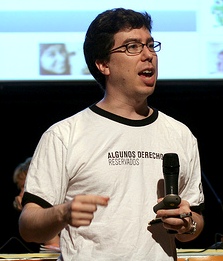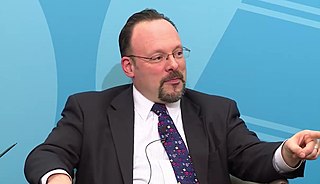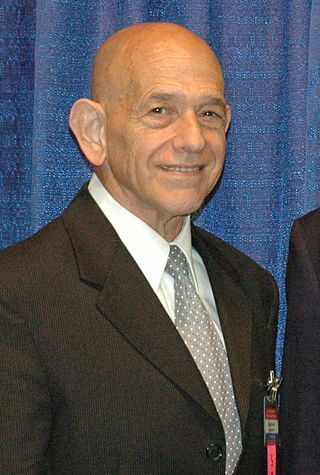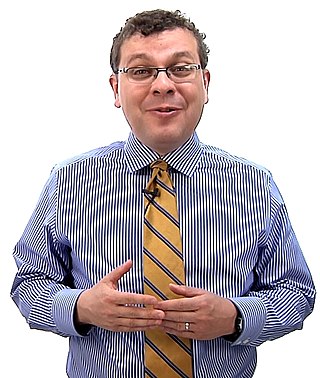
Lester Lawrence Lessig III is an American legal scholar and political activist. He is the Roy L. Furman Professor of Law at Harvard Law School and the former director of the Edmond J. Safra Center for Ethics at Harvard University. Lessig was a candidate for the Democratic Party's nomination for president of the United States in the 2016 US presidential election but withdrew before the primaries.

Jonathan L. Zittrain is an American professor of Internet law and the George Bemis Professor of International Law at Harvard Law School. He is also a professor at the Harvard Kennedy School, a professor of computer science at the Harvard School of Engineering and Applied Sciences, and co-founder and director of Harvard's Berkman Klein Center for Internet & Society. Previously, Zittrain was Professor of Internet Governance and Regulation at the Oxford Internet Institute of the University of Oxford and visiting professor at the New York University School of Law and Stanford Law School. He is the author of The Future of the Internet and How to Stop It as well as co-editor of the books, Access Denied, Access Controlled, and Access Contested.

Douglas Howard Ginsburg is an American lawyer, jurist, and academic who serves as a senior judge on the U.S. Court of Appeals for the District of Columbia Circuit. He was appointed to that court in October 1986 by President Ronald Reagan, and served as its chief judge from 2001 until 2008. In October 1987, Reagan announced his intention to nominate Ginsburg as an associate justice of the United States Supreme Court. But Ginsburg withdrew his name from consideration before being formally nominated, after news reports that he had smoked marijuana in the past created controversy.

Orin Samuel Kerr is an American legal scholar and professor of law at the UC Berkeley School of Law. He is known as a scholar in the subjects of computer crime law and internet surveillance. Kerr is one of the contributors to the law-oriented blog titled The Volokh Conspiracy.

The Volokh Conspiracy is a legal blog co-founded in 2002 by law professor Eugene Volokh, covering legal and political issues from an ideological orientation it describes as "generally libertarian, conservative, centrist, or some mixture of these." It is one of the most widely read and cited legal blogs in the United States. The blog is written by legal scholars and provides discussion on complex court decisions.

David B. Kopel is an American author, attorney, gun rights advocate, and contributing editor to several publications.
James Lindgren is a professor of law at Northwestern University. Born in 1952 in Rockford, Illinois, Lindgren graduated from Yale College and the University of Chicago Law School (1977), where he was an editor of the University of Chicago Law Review. He received his Ph.D. in Sociology from the University of Chicago in 2009.
United States v. Virginia, 518 U.S. 515 (1996), is a landmark case in which the Supreme Court of the United States struck down the long-standing male-only admission policy of the Virginia Military Institute (VMI) in a 7–1 decision. Justice Clarence Thomas, whose son was enrolled at the university at the time, recused himself.

David E. Bernstein is a law professor at the George Mason University School of Law in Arlington, Virginia, where he has taught since 1995. His primary areas of scholarly research are constitutional history and the admissibility of expert testimony. Bernstein is a contributor to the legal blog The Volokh Conspiracy. Bernstein is a graduate of the Yale Law School, where he was a John M. Olin Fellow in Law, Economics and Public Policy, a Claude Lambe Fellow of the Institute for Humane Studies, and a senior editor of the Yale Law Journal. He received his B.A. degree summa cum laude with honors in History from Brandeis University.
Golan v. Holder, 565 U.S. 302 (2012), was a US Supreme Court case that dealt with copyright and the public domain. It held that the "limited time" language of the United States Constitution's Copyright Clause does not preclude the extension of copyright protections to works previously in the public domain.

Jessica Litman is a leading intellectual property scholar. She has been ranked as one of the most-cited U.S. law professors in the field of intellectual property/cyberlaw.

Jonathan H. Adler is an American legal commentator and law professor at the Case Western Reserve University School of Law. He has been recognized as one of the most cited professors in the field of environmental law. His research is also credited with inspiring litigation that challenged the Obama Administration's implementation of the Affordable Care Act, resulting in the Supreme Court's decision in King v. Burwell.

Robert A. Levy is the chairman of the American libertarian Cato Institute as well as a director of the Institute of Justice, and the organizer and financier behind District of Columbia v. Heller, as well as Heller's co-counsel, in the U.S. Supreme Court Case that established the Second Amendment to the United States Constitution as affirming an individual right to gun ownership. He is a Cato senior fellow and an author and pundit. Before becoming a lawyer, he was the founder and CEO of CDA Investment Technologies. Levy is the founder of The Robert A. Levy Fellowship in Law and Liberty which encourages talented scholars to pursue a JD degree at Antonin Scalia Law School, George Mason University.

Code and Other Laws of Cyberspace is a 1999 book by Lawrence Lessig on the structure and nature of regulation of the Internet.

Martin David Ginsburg was an American lawyer who specialized in tax law and was the husband of lawyer and U.S. Supreme Court Justice Ruth Bader Ginsburg. He taught law at Georgetown University Law Center in Washington, D.C., and was of counsel in the Washington, D.C., office of the American law firm Fried, Frank, Harris, Shriver & Jacobson.
Peter William Huber was a Canadian-American lawyer and author who served as a senior fellow at the Manhattan Institute and was a founding partner at the law firm of Kellogg, Huber, Hansen, Todd, Evans & Figel. He is credited with popularizing the term "junk science" in 1991, and articulating a conservative approach to environmentalism in his 2000 book, Hard Green: Saving the Environment from the Environmentalists.

Ilya Somin is a law professor at George Mason University, B. Kenneth Simon Chair in Constitutional Studies at the Cato Institute, a blogger for the Volokh Conspiracy, and a former co-editor of the Supreme Court Economic Review (2006–2013). His research focuses on constitutional law, property law, migration rights, and the study of popular political participation and its implications for constitutional democracy.

Joshua Michael Blackman is an American lawyer who is employed as an associate professor of law at the South Texas College of Law where he focuses on constitutional law and the intersection of law and technology. He has authored three books.
Aziz Z. Huq is an American legal scholar who is the Frank and Bernice J. Greenberg Professor of Law at the University of Chicago Law School. He is a leading scholar in the areas of constitutional law, federal courts, and criminal procedure. His work in constitutional law principally focuses on individual rights and liberties under the U.S. Constitution.
Duncan Hollis is an American legal scholar and the Laura H. Carnell Professor of Law at Temple University’s Beasley School of Law known for his expertise on treaties and the application of international law to cyberspace. He has been a prominent advocate for a new treaty to regulate States' behavior on-line and establishing an international legal duty to assist victims of significant cyberattacks.














